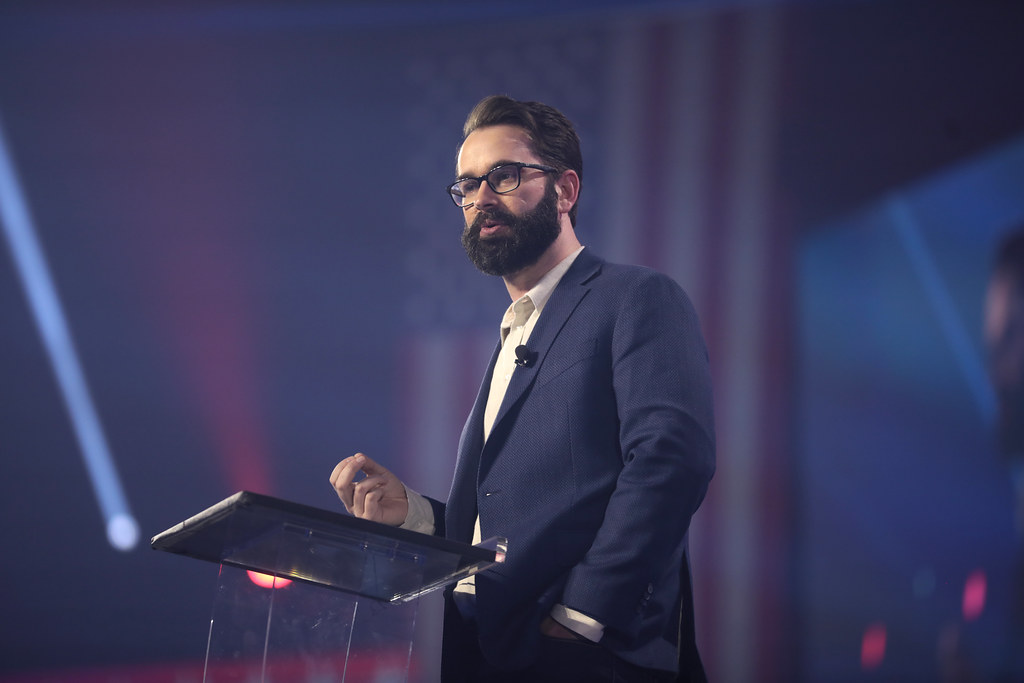The opening weekend for podcaster Matt Walsh’s Am I Racist? put the film at number 4 for ticket sales in the country, which is pretty remarkable for a movie going so against the current media grain that it has yet to be reviewed by any major news organization. While it is impossible to be sure what the ultimate cultural importance of this movie will be, I do think Walsh has hit a nerve. Certainly a lot of folks—of all colors—who have suffered from the aggressive victimization of DEI are ready for some payback. They are going to get it from Matt Walsh.
Am I Racist? is a gotcha movie and a mockumentary, yes, but its humor is in service to a larger point than simply laughs. Walsh has a thesis: seeing the world through the lens of racial revenge is neither useful nor ethical.
Well-shot and well-edited, the movie is also well-written. There are some very, very good lines—many no doubt scripted but others that must have been ad-libbed—and Walsh delivers them with his convincing deadpan in the unconvincing (and hence very funny) wig he wears as part of his DEI-fellow-traveler disguise.
Some of his subjects deserve every bit of the exposure they get. University of Washington education professor Robin DiAngelo, a top-of-the-charts bestselling author for her book White Fragility, shows herself to be a little grasping, perfectly polite, and very willing to speak a racial apology to the black man Walsh suddenly brings into their interview. The philosophical high point of the film is the moment Walsh succeeds in using DiAngelo’s own logic to pressure her to do something that logic makes essential. It is a great scene, and all all the more arresting for her obvious unwillingness. Walsh has put the puzzle of her chaotic mind all together for her, and she really doesn’t like the result.
Then there is Saira Rao, an American-born daughter of Indian immigrants, whose statements are the most incendiary in the movie. They are not funny. With her consciousness-raising partner Regina Jackson, a black woman, she runs an organization called Race2Dinner. For a $5,000 fee, and working with clients who provide the setting and the food, Rao and Jackson bring together small groups of white women to confront their buried racism.
Only white women are allowed at these meals. Rao has said elsewhere that she has no hope for white men, but maybe she just knows her market. Surely even in Boulder or Berkeley you couldn’t easily find ten white men willing to pay high dollar to sit through an aggressively personal self-hating session like hers. (How I wish my own sex would woman up!) To watch Rao at the head of a table laid with flowers and crystal, looking for all the world like she’s presiding over a bridal shower, and then to hear her say things like, “The entire system has to burn… this country is not worth saving; this country is full of ——” is remarkable—not least because while she may be ready utterly to foul her own nest, apparently she is going to finish dessert first.
Matt Walsh’s great strength as a writer and actor (with the help of co-writers Justin Folk and Brian A. Hoffman) is in asking questions that prod people accurately to define how they see the world. Walsh’s best “gotchas” come about as he asks sophisticated and supposedly educated people to clarify exactly what it is they mean. The Disney princess discussion he has with author Kate Slater at the beginning of the film is a perfect example of this—what we see is not a rube falling into a rhetorical pit, but an articulate and self-confident true believer kicking an own goal. The best parts of this movie are really good.
Walsh has taken some criticism for fooling his subjects, telling them he was making a film about DEI and not mentioning that it would be critical. I feel any so-called professional, DEI or otherwise, ought to be fair game for an interview. If you make your living from certain arguments, you need to be willing to stand by them, no matter who is asking you questions–and particularly if you are willing to sign a film release. If Walsh were misrepresenting their stances, that would be another matter and would indeed be unfair. But he is not.
I am less comfortable about exposing the attendees at these classes and dinners, regular folks who showed up to talk and listen. The scene I found most difficult was Matt-the-character’s “graduation” project, in which he led his own DEI class. There are a few credited actors in this film—playing Walsh’s black friend and his racist uncle and a few other roles—but I don’t think the people in his DEI class were among them. I seemed to be watching real people, in whom Walsh instigates some absurd and ugly behavior, all of which is caught on film.
This is done in service to the larger point, that DEI rhetoric makes us worse humans and not better, but it still hurts to watch it, especially since these are not people who appear to have a lot of social capital. Can it ever be ethical to encourage people to act savagely? Even to make a strong case at a time when a strong case needs to be made–when we are in a real cultural fight?
I know Walsh is showing here, better than he could ever tell, that bad ideology and social pressure can work a lot of harm. He could not have made his case as vividly without showing these people putting common DEI advice into action. I have to add that elsewhere in the film, Walsh takes great care not to make fun of the regular people he talks to–most of whom are the sort Borat would have had on toast. In numerous scenes Walsh sets himself up as the ridiculous one, asking his absurd DEI questions, while his often working class interviewees show good humor and good sense. Walsh has to be the only filmmaker on the planet who would go into a biker bar decorated with Confederate flags and come out showing that he found no racists there. Clearly, he has considered what he might be doing to the people he filmed. So I can only hope that some of his workshop attendees–the ones who acted the worst–were in on the pointed joke.
Probably they were not. I still say you should see this movie. If you do, you may ask yourself, as I did, will it change any minds? Maybe not. But maybe so. Maybe it is useful to anyone who has been bullied silent or shouted down by DEI to see someone laughing at arguments that continue to have a good deal of social power. In the fairy tale, no one was willing to say the emperor had no clothes—until a little boy laughed.
Image via Flickr








6 comments
Stephen Alexander
If you work in a university, characters like Rao dominated every aspect of your work life – research ethics, hiring, curriculum reform, HR, disciplinary procedures, university policy making (e.g. on partnerships) …. and the system elevates the activists at every level. You have a school undergrad society? It will be led by people espousing these ideas. You want to distribute a circular through the faculty mail list? The gatekeeper screening certain events out will be DEI trained. It is catastrophic – not least because it is costing universities billions of dollars. Most big universities will have 1-200 DEI specialists working only on this stuff…..the salaries alone are gigantic. And people wonder why HE costs so much. This is a big reason. It’s a hustle. And yes the film is brilliant. If I tried to show it at work, I might well get fired.
John Murdock
Appreciate Kate’s take on the film (which I’ve yet to see). It’s a serious topic but I raise a not so serious question: Is it really a “mockumentary”?
I put films like “A Mighty Wind” and “This is Spinal Tap” in that category. This film sounds more like a Michael Moore or Morgan Spurlock offering but from the other side of the horseshoe. So, maybe that’s a “mocking documentary”—promoting a point of view but not fictional?
Forgive the wordy lawyer, but as my penance enjoy this anthem from a time when the left could still laugh, even at itself. “It’s blowing peace and freedom, it’s blowing equality!”
https://www.youtube.com/watch?v=iruTeBtwlvU
Karen Olson
I don’t think it’s too late for this, as some have asserted. The reason DEI seems quieted down now is that nearly every organization–especially all kinds of schools and colleges–have incorporated DEI into their workplaces and budgets. It’s everywhere. Finally, it’s OK to examine it.
James B Quinn
A fair review. The movie with worth seeing, and the exposing of the racial revenge motive and its impact on people is much needed. Walsh gives his own conclusion at the end of the movie which was for me the most moving scene.
Brian
This is all so very inside baseball and hopelessly dated. DiAngelo got rich selling her trash to AWFLs, but they’ve all moved on, no one cares about her anymore. She was very, very niche. I guarantee you the average person who didn’t subscribe to the New York Times had never heard of her even at her peak, and most of her acolytes from the far distant age of the first Trump presidency have probably forgotten her name by now. What even is the point of mocking her now?
Rob G
“This is all so very inside baseball and hopelessly dated.”
Not if you work in corporate America, it isn’t. I work for a large national company and we see this stuff virtually every day. These DEI clowns may have personally had their days, but their impact and influence lives on.
Comments are closed.